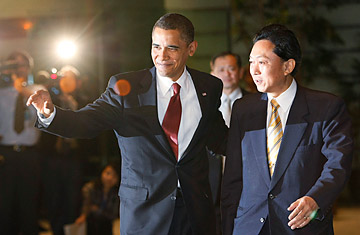
President Obama walking with Japanese Prime Minister Yukio Hatoyama in Tokyo, November 13, 2009.
They stood in a smiling pose, two leaders locked in another international grip 'n' grin, pantomiming the deep ties between their countries. Later, at a press conference, it was more of the same, as if they were two new chums who had just finished a round of golf.
"We have come to call each other Barack and Yukio," said Japanese Prime Minister Yukio Hatoyama. "I've grown quite accustomed to calling each other by our names." A moment later, President Barack Obama returned the sentiment. "Both Yukio and I were elected on the promise of change," he said. "But there should be no doubt, as we move our nations in a new direction, our alliance will endure."
That is the positive face of the Obama era of diplomacy; it is the story that both leaders and their respective diplomatic corps want to broadcast. Japan and the United States stand together, connected by history and, as Obama announced, "bound" by the Pacific Ocean. Fact sheets were distributed to reporters as further evidence, showing agreements on climate change, on nuclear nonproliferation, on clean energy technologies.
But the clenched hands tell only part of the story, beyond which new tensions add pressure to the relationship between the world's two largest national economies. Hatoyama's "change" campaign, for example, which shifted party control in Japan for the first time in a half-century, was marked in part by a more aggressive posture toward the United States. As he appealed for votes, Hatoyama spoke of seeking a more equal relationship" with America, a phrase that implied a continuation of the postwar subjugation of Japan.
Since taking office, Hatoyama has forced two small but notable concessions from the United States. At Hatoyama's direction, Japan will end its refueling program for U.S. warships in the Indian Ocean that support the military effort in Afghanistan, choosing instead to donate $5 billion to humanitarian and training support in the war-torn country. At the same time, Hatoyama has forced the Obama administration to reopen talks about the U.S. military presence on the Japanese island of Okinawa, just weeks after Defense Secretary Robert Gates came to Japan to announce that the issue was closed, and some marines would stay. "It is time to move on," Gates said.
In their press conference there was some hint of the discord, especially as it related to the basing of U.S. marines on Okinawa. Obama said the continuing discussions over U.S. bases in Japan would "focus on the implementation of the agreement" that was already struck. Hatoyama, by contrast, spoke of the possibility of considering relocation of U.S. forces "outside Okinawa and outside of the country."
In a way, this tension between the public celebration of friendship and the quiet struggle over intractable issues is a microcosm for Obama's first year on the world stage. On Saturday night, Obama landed in Singapore, the 18th nation he has visited in just 10 months, far more than any of his predecessors. At almost every stop, he has espoused a new vision for world relations, one of greater communication, collaboration and cooperation, even among historic foes. "As I have said, in an interconnected world, power does not need to be a zero-sum game, and nations need not fear the success of another," Obama said Saturday morning, in a speech at Tokyo's Suntory Hall, a modern concert hall.
This message has been received warmly by both political leaders and the nations they represent. According to a poll this summer of public opinion in 21 major countries by the Pew Global Attitudes Project, a median of 71% of the population said they have a lot of confidence in Obama to do the right thing in world affairs. Just a year earlier, President George W. Bush had scored just 17% in the same measure. In some parts of Asia, Obama's popularity is particularly high, with 85% of the Japanese public and 81% of the South Korean public expressing confidence in the new American president.
But the popular and rhetorical success has not yet been matched by resolution of the United States' foreign policy challenges, not only in Pakistan, Afghanistan and North Korea, but also among allies. Several Asian nations, most particularly South Korea, have waited anxiously for word that Obama intends to prioritize finalizing a new free trade agreement, something the White House has begun to signal this week. China, meanwhile, has expressed growing concern about the U.S. trade policy and the spiraling U.S. national debt, which endangers the value of China's vast investment in U.S. currency.
In his Tokyo speech Saturday, Obama addressed both concerns, but he did not lay out specific benchmarks for achieving them. "None of this will come easy," Obama said of his foreign policy goals in the region, "nor without setback or struggle." In the meantime, he seemed to be suggesting, it was important to make a public show of unity and a promise of greater engagement to come. Perhaps after that, he can begin to find solutions to the more challenging problems. As Obama concluded his speech, his rhetoric soared even higher. "At this moment of renewal," he said, "in this land of miracles, history tells us it is possible." The audience of dignitaries and diplomats offered their applause.
